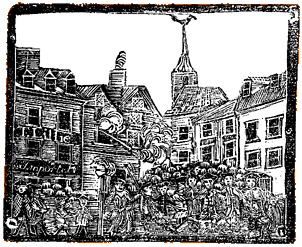William Molineux Saves Ebenezer Richardson's Neck
 When Ebenezer Richardson shot Christopher Seider from his window on 22 Feb 1770, the Bostonians watching were naturally upset. Richardson was already unpopular, and shooting an eleven-year-old in broad daylight didn’t improve his image, even though a mob of boys was attacking his house. A witness taking notes for the Crown said:
When Ebenezer Richardson shot Christopher Seider from his window on 22 Feb 1770, the Bostonians watching were naturally upset. Richardson was already unpopular, and shooting an eleven-year-old in broad daylight didn’t improve his image, even though a mob of boys was attacking his house. A witness taking notes for the Crown said:
they Rang the Brick meeting bell as if for fire which soon Collected a vast Concourse of people, who broke down the side of his house & when they had made a breach wide enough several entered & took Richardson & one Wilmot who assisted him, seized him and his companion George Wilmot, and marched them outside.Wilmot, a sailor for the Customs service, quickly gave up, protesting that his gun was defective and couldn’t have fired even if he’d tried. Richardson, in contrast, had briefly fended off the crowd with a cutlass, shouting about the wounded boys, “Damn their blood! I don’t care what I’ve done!” Some in the mob prepared to hang Richardson right there, even though those two boys were still alive.
By this time the merchant William Molineux had arrived on the scene. He was one of the most radical Whigs in Boston, shocking even fellow gentlemen with his extreme comments. (Gentlemen were never supposed to be extreme.) For example, after a meeting of merchants on nonimportation on 12 Jan 1770, the Crown informant reported:
Many were disgusted at Mollyneaux’s violent proposals particularly at a speech made at the meeting at which the vote against [Joseph] Green [Theophilus] Lillie &c was pass’d, wherein he declared that were it not for the Law he would with his own hands put to Death any person who should presume to open their goods [i.e., sell goods they had imported and then stored]At another of the big nonimportation meetings that month, Molineux proposed that the whole crowd visit two importers at their father’s house. However, their father was Thomas Hutchinson, lieutenant governor and acting governor. Young lawyer Josiah Quincy, Jr., warned dramatically that such an action was a trap, that confronting the representative of the king that way could be taken as treason. Molineux agreed to a small committee instead, but then several upper-class gentlemen declined to serve on it.
The informant described the dramatic result:
It would be impossible Sir to describe the looks of Mollineaux when he found so many had deserted him, he drew his hand across his Throat, and declar’d he was ready to Die that Minute, that for his part he scorn’d to have any thing more to do with them, and then immediately Jump’d down from his Seat among the People with a view to march off, upon this Dr. [Thomas] Young ascended a Form [i.e., a bench], and in the most earnest manner beg’d him for Gods sake to stay, otherwise their Plan would be entirely overthrown, with much perswasion and a great deal of pulling, he was at last fix’d in his former Seat(Another source quotes Dr. Young this way: “Stop Mr. Molineux, stop Mr. Molineux...If Mr. Molineux leaves us we are forever undone, this day is the last dawn of liberty we shall ever see.” Young was much cheerier than Molineux, but equally hyperbolic.)
Earlier in February 1770, witnesses saw Molineux looking on with approval the first time that boys had picketed an importer’s store. And he may well have known Christopher Seider personally; the boy worked in the household of wealthy widow Grizzell Apthorp, and Molineux was the Boston agent for the business of her eldest son.
Yet when the mob threatened to kill Richardson, Molineux waded into the crowd, insisting that they let the law take its course. Gov. Hutchinson himself reported that Molineux managed to calm the people and lead the prisoners to Justice John Ruddock. That North End magistrate, also a fervent Whig, decided to take the prisoners to Faneuil Hall, where four other justices gathered. In front of the large crowd, they questioned the two men, charging Richardson with a dangerous assault and Wilmot as his accessory.
Then the justices sent the two prisoners to Boston’s jail in the custody of some town constables. Ordinarily those officials delivered writs and seized property; they really weren’t prepared to be police officers or marshals. The mob once again tried to string Richardson up on his way to jail:
it was with difficulty that they got Richardson there, the mob endeavouring to put a rope about his Neck & take him from the Constables to execute him themselves, but was prevented by some leading men of the popular side.At last, thanks to Molineux and his Whig colleagues, Richardson was safely behind bars. After Christopher Seider died that evening, the charges against him were upgraded to murder. The superior court was due to open on Monday, 13 March.

No comments:
Post a Comment